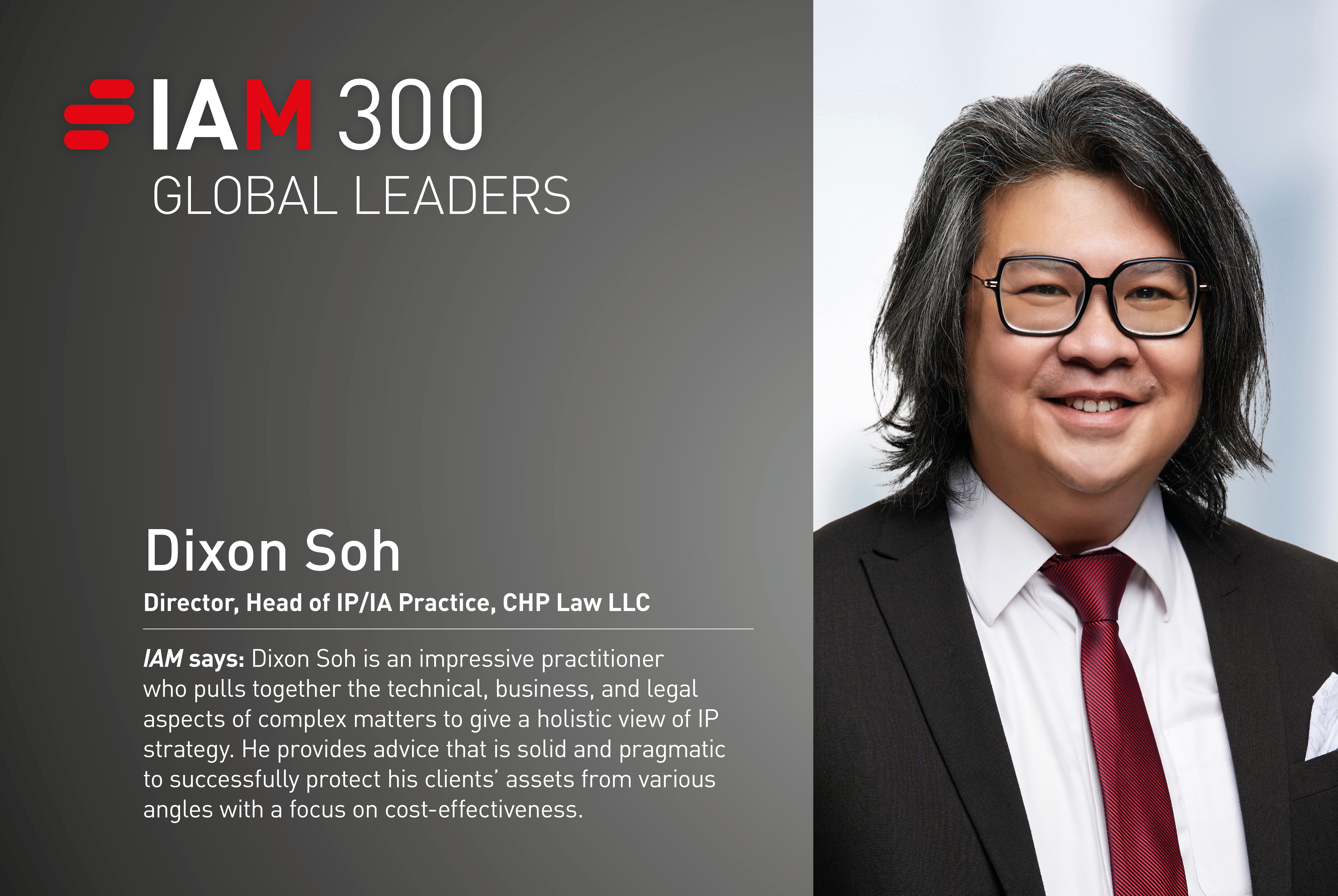Dixon Soh
What inspired you to pursue a career in intellectual property, and what advice would you offer to others considering a similar path?
Intellectual property is a celebration of human achievements – trademarks (business aspirations), patents (inventiveness) and copyrights (artistic expression). The formation of IP laws, which are largely based on international treaties, also demonstrates collaboration among stakeholders in different jurisdictions. These are some of the characteristics that attracted me to IP law.
Much has changed since I started practising. Products have become more complex. Intellectual property is not just a construct of law but also a commercial asset. Anyone aspiring to work in this field must be sensitive to business concerns and understand how intellectual property interacts with the company’s operations to achieve commercial goals.
IP counsel must be able to recognise pressure points and aspirations, then develop and strategise to support the client’s growth plans. An understanding of IP law is fundamental. Your ability to understand how to align intellectual property to business growth is your key to success.
You cover a wide range of subjects in your practice. How do you stay abreast of the latest developments in such a broad variety of sectors?
Learning is critical, particularly if you are dealing with fast-moving technology. There are three ways to learn: reading, learning from others and doing it yourself.
I am lucky because I have many opportunities to work on different interesting technologies. On a usual day, I will first sit down with the key operators (ie, business development, production and CEO) to understand the business and the environment in which it operates. Each experience is different, which makes my job really interesting!
Since 2002, I have committed 15 minutes every day to read – it could relate to my job or be some random information like game business trends. While initially this knowledge only armed me for community pub quizzes, these elements do connect and enhance my perspective for my everyday work.
What recent policy developments are having the biggest impact on IP strategy in Singapore and the South-East Asian region?
New WIPO leadership has brought positive changes to the Association of South-East Asian Nation’s business environment. Like Director General Daren Tang promised, WIPO has moved from being a technical agency to a developmental one. The pilot programme in Indonesia is a great start. It brought some much-needed experience regarding IP strategy to Indonesia.
The IP management clinic highlights significant efforts to help Indonesian businesses understand how IP strategy is done in other jurisdictions and in Singapore, with the aim that those skills will be cultivated and adapted to local flavours. This is an accelerator for Indonesia, which has always had the potential to be an IP hub. The clinic is designed to influence positive development in the long term and needs more success stories to further engage stakeholders.
With the world’s fourth largest population, Indonesia is large and varied in culture and language. It is hoped that clinics like this will provide tools to help the country get on board with IP strategy. How fast it happens depends on a whole range of different factors What are the most important steps of any intangible asset valuation process?
The most fundamental step is to run a stocktake of the assets to understand what you are working with. Then, look at the business and the environment in which it operates, which will provide perspective on potential gaps to close before the matter goes to the valuer. You also need to find ways to effectively communicate to the valuer how the assets support the business growth.
As former in-house counsel, how would you emphasise patent value to the C-suite in today’s economic climate?
Patents are one of many methods to harness value. A whole bunch of assets wrap around a patent but are often missed out in M&A due diligence events and internal invention discovery processes (ie, information that leads to a product’s creation, including failed attempts).
The importance of IP intelligence is often omitted. One must not be slavishly reliant on patent intelligence – it is vital to tap into a range of databases to give better meaning to the initial report based on patent information.
IP information is rich. It is not just about understanding the technology or competitive landscape. It also gives you a view on potential licensees, buyers or collaborators to work with. It will enable IP strategists to devise creative approaches to assist clients in harnessing better corporate value from their assets.
Dixon Soh
Director, Head of IP Practice
[email protected]
Dixon Soh has practised law as a private practitioner, in-house legal counsel and as a public sector IP strategist. He has advised numerous entities across many technology verticals, such as gaming, e-commerce, media tech, food tech, medical tech and AI. Holding qualifications to practise law in Singapore, Australia and New Zealand, Mr Soh was also one of the key contributors involved in the formulation of the Singapore IP Strategy 2030 – Singapore’s 10-year IP road map.
